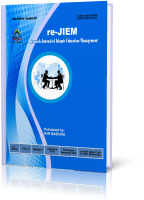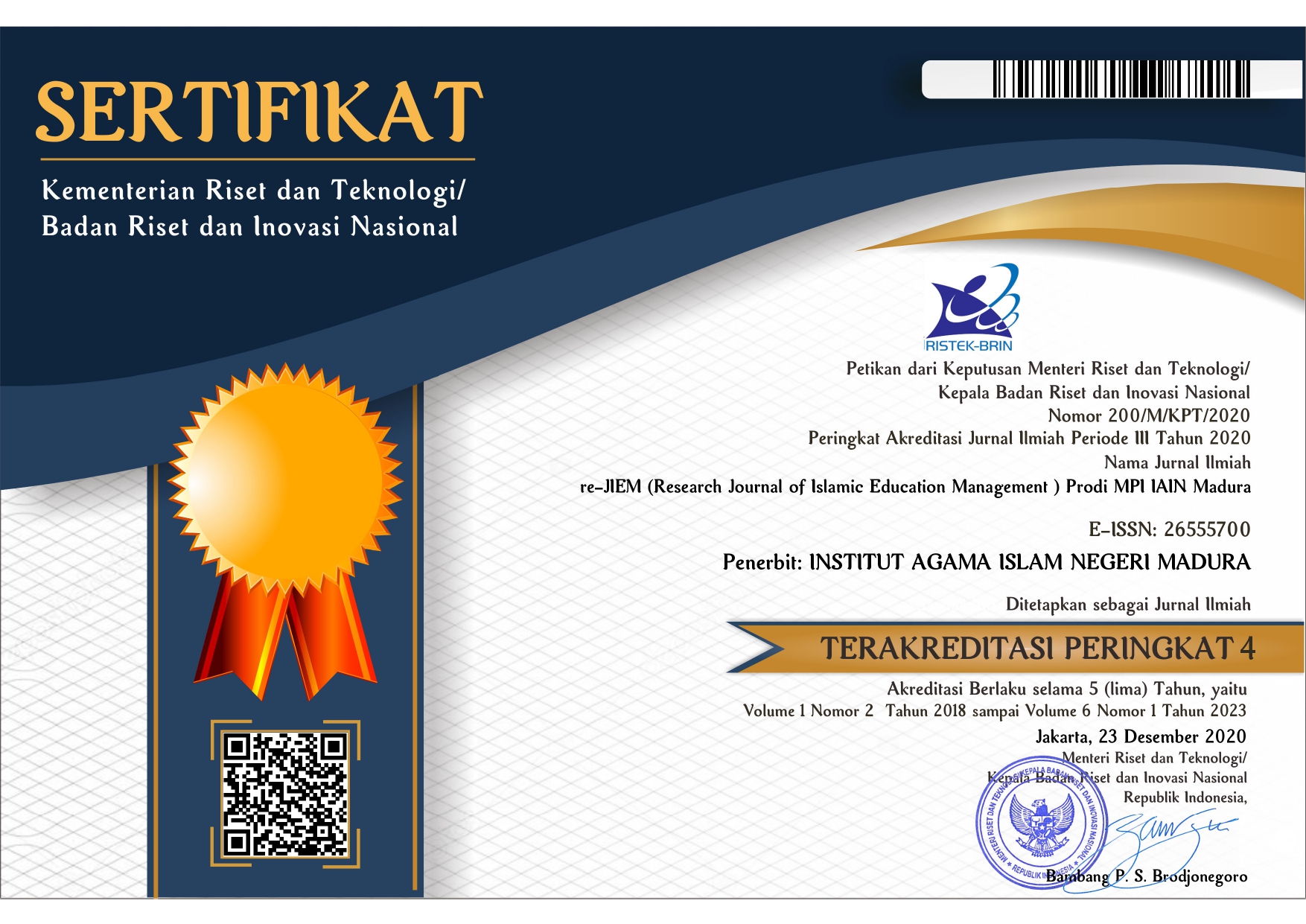THE AL-MUNAWWARAH MODEL; CASE STUDY ON INSTITUTIONALIZING PROPHETIC LEADERSHIP TO FOSTER AN EXCELLENT ORGANIZATIONAL CULTURE
 Abstract views: 197
,
Abstract views: 197
,
 PDF downloads: 119
PDF downloads: 119
Abstract
Many Islamic educational institutions face the challenge of translating the noble values of prophetic leadership into effective operational strategies. This research addresses this gap by analyzing the strengthening model of prophetic leadership in building an excellent organizational culture at Al-Munawwarah Islamic Elementary School. Through a descriptive qualitative approach, this study finds that leadership effectiveness is not merely conceptual but is manifested in specific policies. Among these are the systematic integration of Islamic values into the national curriculum, the implementation of consistent disciplinary rules for teachers and students, such as the use of a public tardiness list, and the development of a collaborative culture through intensive vision communication and motivation. As a result, an educational environment that measurably supports the formation of students' moral character is established. This study offers a practical contribution in the form of an implementable framework, demonstrating how prophetic leadership principles can be translated into tangible programs and policies, making it replicable for other educational institutions.
Downloads
References
Adhikari, Narayan Prasad, and Jhupa Kumari Budhathoki. “Organizational Ethos: Empact on Work Performance of Employees.” Cognition 6, no. 1 (2024): 65–74. https://doi.org/10.3126/cognition.v6i1.64441.
Agustin, Maulid, and Firmansyah. “Peran Kepemimpinan Kepala Sekolah Dalam Meningkatkan Kinerja Guru Di Lembaga Islam.” Jurnal Pendidikan Islam 14, no. 02 (2023): 87–98. https://doi.org/10.22236/jpi.v14i02.13384.
Arbi. “Improving Quality of Islamic Education Through Community Based Education: Principal Engagement.” Jurnal Pendidikan Islam 4, no. 1 (2018): 39–50. https://doi.org/10.15575/jpi.v4i1.2095.
Arifin, Imron, Juharyanto, Mustiningsih, and Ahmad Taufiq. “Islamic Crash Course as a Leadership Strategy of School Principals in Strengthening School Organizational Culture.” SAGE Open 8, no. 3 (2018). https://doi.org/10.1177/2158244018799849.
Astuti. “Value-Based Islamic Education Management: Developing Leadership and Commitment in Contemporary Islamic School Environments.” Edelweiss Applied Science and Technology 8, no. 5 (2024): 454–64. https://doi.org/10.55214/25768484.v8i5.1709.
Aulia, Nurul Affika, and R. Madhakomala. “Peran Kepala Sekolah Dalam Memotivasi Pembiasaan Shalat Dhuha Dan Shalat Fardhu Berjamaah Untuk Meningkatkan Kedisiplinan Siswa.” Jurnal Pendidikan Islam 1, no. 2 (2023): 1–11.
Bass, Bernard M. “From Transactional to Transformational Leadership: Learning to Share the Vision.” Organizational Dynamics 18, no. 3 (1990): 19–31. https://doi.org/https://doi.org/10.1016/0090-2616(90)90061-S.
Döş, İzzet, and Ahmet Cezmi Savaş. “Elementary School Administrators and Their Roles in the Context of Effective Schools.” SAGE Open 5, no. 1 (2015). https://doi.org/10.1177/2158244014567400.
Fanani, Zainuddin, Basri, and Ahmad Sonhadji. “Management of Character Education in Creating Student Morals: A Multiple-Case Study.” Jurnal Pendidikan Islam 11, no. 1 (2022): 95–105. https://doi.org/10.14421/jpi.2022.111.95-105.
Goleman, Daniel. Emotional Intelligence: Why It Can Matter More than IQ for Character, Health, and Lifelong Achievement. New York City, USA: Bantam Books, 1995.
Greenleaf, Robert K. Servant Leadership; a Journey Into The Nature of Legitimate Power & Greatness. New Jersey, USA: Paulist Press, 2002.
Hakiem, Hilman, Abrista Devi, Nendi Mulyadi, Iis Islahudin, and Nadiya Atika. “Islamic Scholar Thought on Intrapreneurial Leadership Characteristic Framework for Islamic Education Institutions.” Educational Administration: Theory and Practice 29, no. 3 (2023): 216–37. https://doi.org/10.52152/kuey.v29i3.728.
Hyseni Duraku, Zamira, and Linda Hoxha. “Impact of Transformational and Transactional Attributes of School Principal Leadership on Teachers’ Motivation for Work.” Frontiers in Education 6, no. June (2021): 1–9. https://doi.org/10.3389/feduc.2021.659919.
Kanavas, Christos, and Sotiria Triantari. “Τhe Rational Decision-Making and the Social Responsibility in the Optimal Functioning of the School.” Cogent Social Sciences 10, no. 1 (2024). https://doi.org/10.1080/23311886.2024.2419542.
Kouzes, James M., and Barry Z. Posner. The Leadership Challenge. San Francisco, CA: Jossey-Bass A Wiley Imprint, 2007.
Matkó, A., and T. Takács. “Examination of the Relationship between Organizational Culture and Performance.” International Review of Applied Sciences and Engineering 8, no. 1 (2017): 99–105. https://doi.org/10.1556/1848.2017.8.1.14.
Mobonggi, Arten, Ibnu Rawandhy N. Hula, Fatimah Djafar, Febrianto Hakeu, and Ana Mariana. “The Principal’s Managerial Influence on Mover Teachers in the Implementation of the Independent Curriculum.” TEM Journal 13, no. 3 (2024): 2177–85. https://doi.org/10.18421/TEM133-45.
Mubah, Hilmi Qosim. “Pemimpin Profetik Dalam Memotivasi Kerja Personalia Pendidikan Melalui Pendekatan Spiritual Perspektif Al-Qur’an.” In The 3rd Annual Conference On Islamic Education Management. Surabaya: PPMPI, 2021.
Mubah, Hilmi Qosim, Badrus Soleh, Kacung Wahyudi, Erny Roesminingsih, and Haris Supratno. “Leadership Concept Analysis Study in Islamic Perspective.” Re-JIEM (Research Journal of Islamic Education Management) 7, no. 2 (2024): 343–61.
Nik Muhammad, Nik Maheran. “Prophetic Leadership Model: Conceptualizing a Prophet’s Leadership Behaviour, Leader-Follower Mutuality and Altruism to Decision Making Quality.” European Journal of Interdisciplinary Studies 3, no. 1 (2015): 93. https://doi.org/10.26417/ejis.v3i1.p93-106.
Pivec, Nataša, and Vojko Potočan. “Strength of Culture and Transfer of Knowledge in Organizations.” Management (Croatia) 26, no. 1 (2021): 21–35. https://doi.org/10.30924/MJCMI.26.1.3.
Pusvitasari, Rita. “Discipline Culture Development at Thayaiwittaya School Khuang Lang Hatyai Songkhla Southern Thailand.” Nazhruna: Jurnal Pendidikan Islam 6, no. 2 (2023): 174–89. https://doi.org/10.31538/nzh.v6i2.2746.
Rahmi, Sri. “Headmaster’s Leadership in Solving Problems at Islamic Elementary School (SDI) Hikmatul Fadhillah Medan.” Jurnal Pendidikan Islam 7, no. 2 (2019): 267–80. https://doi.org/10.14421/jpi.2018.72.267-280.
Robbins, Stephen P., and Timothy A. Judge. Organizational Behavior. New Jersey: Pearson Education, 2015.
Said, Saidah Mohd, and Sabariah Sharif. “Unveiling the Excellent Leadership Qualities and Practices of Principals in Islamic Schools: A Systematic Literature Review.” International Journal of Learning, Teaching and Educational Research 22, no. 9 (2023): 43–61. https://doi.org/10.26803/ijlter.22.9.3.
Schein, Edgar H. Organizational Culture and Leadership. 4th ed. San Francisco, CA: Jossey-Bass A Wiley Imprint, 2010. https://doi.org/10.4324/9781003366355.
Setyaningsih, Dwi. “Implementasi Manajemen Strategi Dalam Meningkatkan Mutu Pendidikan.” Pedagogika 13, no. Nomor 01 (2022): 24–34.
Strengers, Julia, Leonie Mutsaers, Lisa van Rossum, and Ernst Graamans. “The Organizational Culture of Scale-Ups and Performance.” Journal of Organizational Change Management 35, no. 8 (2022): 115–30. https://doi.org/10.1108/JOCM-09-2021-0268.
Suriagiri. “Good Practice of Educational Leadership to Succeed in The School Literacy Movement.” Nazhruna: Jurnal Pendidikan Islam 5, no. 3 (2022): 972–87. https://doi.org/10.31538/nzh.v5i3.2338.
Tulcanaza-Prieto, Ana Belén, Iliana E. Aguilar-Rodríguez, and Carlos Artieda. “Administrative Sciences Organizational Culture and Corporate Performance in the Ecuadorian Environment.” Administrative Science 11, no. 132 (2021): 2–17.
Wasehudin, Muh Barid Nizarudin Wajdi, Silahuddin, Imam Syafei, Rumbang Sirojudin, Machdum Bahtiar, and Uswatun Hasanah. “The Paradigm of Character Education in Islamic Elementary School.” Jurnal Ilmiah Islam Futura 24, no. 2 (2024): 368–97. https://doi.org/10.22373/jiif.v24i2.22546.
Welsh, Richard O. “Administering Discipline: An Examination of the Factors Shaping School Discipline Practices.” Education and Urban Society 56, no. 7 (2024): 847–80. https://doi.org/10.1177/00131245231208170.
Werang, Basilius Redan, Anak Agung Gede Agung, Riane Johnly Pio, Sandra Ingried Asaloei, and Seli Marlina Radja Leba. “School Principal Leadership, Teachers’ Commitment and Morale in Remote Elementary Schools of Indonesia.” Multidisciplinary Journal of Educational Research 13, no. 3 (2023): 325–47. https://doi.org/10.17583/remie.9546.
Copyright (c) 2025 Istibsyaroh, Saiful Hadi, Abdul Wahid, Atiqullah, Hurriyatul Ifadhah

This work is licensed under a Creative Commons Attribution-ShareAlike 4.0 International License.
Authors who publish with this journal agree to the following terms:
Authors retain copyright and grant the journal the right of first publication with the work simultaneously licensed under a Creative Commons Attribution-ShareAlike 4.0 International License that allows others to copy and redistribute the material in any medium or format with an acknowledgment of the work's authorship and initial publication in this journal and also allows them to remix, transform, and build upon the material for any purpose, even commercially, with contributions under the same license as the original.
Authors are able to enter into separate, additional contractual arrangements for the non-exclusive distribution of the journal's published version of the work (e.g., post it to an institutional repository or publish it in a book), with an acknowledgment of its initial publication in this journal.
Authors are permitted and encouraged to post their work online (e.g., in institutional repositories or on their website) prior to and during the submission process, as it can lead to productive exchanges, as well as earlier and greater citation of published work.




















